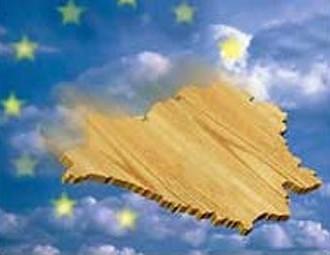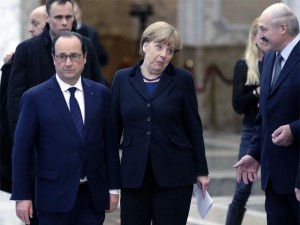The Belarusan National Platform of the EaP CSF issued a statement in connection with the wave of searches in the editorial offices of the Belarusan media and the detention of journalists.
European Dialogue on Modernization with Belarusan society: view from Brussels

One year passed since European Dialogue on Modernization with Belarusan society (EDM) has started. However, the Dialogue does not head the list of foreign policy agenda of the European Union.
During this time the Dialogue was actively evolving in Belarus — subject groups were working, different meetings organized by the EU delegation and Belarusian National Platform of the EaP CSF were held in Minsk, several seminars were conducted in the EU countries.
On April 9 the conference devoted to the discussion of EDM took place in European Parliament. The subject to discuss was an evaluation of effectiveness of EDM after a year of its work. Since the launching of EDM it was the first top-level public event devoted to the discussion of the dialogue itself, its place and importance for the relationships between the EU and Belarus, its strong and weak sides.
The conference was organized by the faction of European People's Party. It should be noted that there are quite few delegates in the Parliament who are actively involved in Belarusan issues. The delegation of the Parliament on European-Belarusan affairs includes 12 delegates, only 4-5 of which work on a regular basis. EDM anniversary became a good occasion for the delegation to hold a public meeting and draw wider attention of the EU delegates to Belarus. Attracting attention and information sharing can be considered the main tasks of this conference. Neither the meeting format nor little involvement of the delegates into EDM over the past period had allowed them to take a close look at this tool. The delegation managed to cope with the task: quite wide range of delegates took part in the conference including high-ranking officials, like Jacek Protasiewicz (Vice-President of the European Parliament), Elmar Brok (chairman of the largest Foreign Affairs Committee in European Union) and others.
Rapporteur on Belarus Justas Paleckis also participated in the conference. Even the speaker’s affiliation to the socialist faction did not provoke contradictions between him and other participants. This is of importance for the report which was prepared by Mr. Paleckis. Two major factions of the European Parliament favor different approaches towards Belarus. The right faction, the largest one, claims to increase the pressure on Lukashenko’s regime. The left one, second in size, is rather a supporter of the moderate course, taking care that the EU policy would not lead to the complete isolation of Belarus. These differences can possibly result in contradictions during the voting on the issue; however, current situation presupposes compromise of all the factions.
Among the participants those who are actively involved both in EDM and in the process of making decisions on it were present. In this regard the last year report was analyzed and future steps on further development of the Dialogue received publicity. Gunnar Wiegand, the director of a division of European External Action Service, reported that in the following year some funds will be allocated for the EDM (500,000 euro). It should be mentioned that before that the Dialogue had been run without any financing. Jerzy Pomianowski (the Deputy Minister of Foreign Affairs of the Republic of Poland, executive officer of the European Foundation for Democracy) in his turn announced a possibility of creation of two new directions — a special format for training and sharing experiences for the representatives of the local authorities and different professional groups. These statements testify to the fact that EU is not going to close the Dialogue or confine it only to relations with the authorities (as proposed the Belarusan officials). Andrei Yahorau, co-coordinator of the 1st EDM working group, also supported the idea of EDM as the finest tool to reach the public consensus on the Belarusan modernization issue. The alternative to such conventional modernization is an authoritarian modernization, which, according to him, would not lead to the progress in political reforms.
Besides, the representatives of the Belarusan opposition parties and movements took part in the conference. During the last year their participation in EDM wasn’t active and was limited to several meetings organized in Minsk and in the EU countries. For this reason they are ill-informed about the realities of EDM and don’t have any meaningful suggestions on its future development. The opposition leaders preferred to talk about Belarusian-European relations in general and from quite different points of view.
So from the Brussels prospective the conference was successful and passed without any surprises. The organizers didn’t specify that to cope with problems and find solutions was the point of the conference; they rather put emphasis on awareness creation and opinion sharing.
A row over the EDM conference, which erupted on Belarusan media, became the only annoying surprise. Just before the conference the BPF Party, the Movement “For Freedom” and “Tell the Truth” Civil Campaign made a statement to the EU. The announcement of the three parties and Andrei Sannikau’s response to it provoked both the media row and an essential shift of emphasis from the disputes about the conference itself to heated discussion over the appropriateness of any dialogue between EU and Belarus at all considering the existence of political prisoners in Belarus.
This announcement was aimed at the Brussels interlocutors, who willingly support the demonstration of cooperation, but at the same time its topic did not have strong connections with the European Dialogue on Modernization. The only connection of this announcement with EDM is that the signers express full support towards this initiative, in such a way indicating that they belong to the process. This announcement also cannot be called revolutionary or at least innovative. This is not the first declaration of its kind; for instance, “The Brussels declaration” adopted in October 2012 can be recalled here.
This media row had a notable negative influence for EDM, as a matter of fact the discussion of the Dialogue in Belarus failed because of it. The opinions of competent specialists created little stir in Mass Media due to a stream of competing accusations of the opposition leaders, and the Dialogue itself received slightly negative estimation in Belarusan independent media.
Nevertheless, the attitude of Brussels towards the European Dialogue on Modernization is at large very positive. The initiative is supported both by the EU bodies and other EU member states and this positive context can be used to attract more attention to Belarus in general. The discordance of media attitudes between Brussels and Minsk creates an additional negative side effect and increases the general fatigue from “the Belarusan question” among the European politicians. Among other issues, this will strengthen the position of those who stick to simple decisions on Belarus, like freezing of cooperation on a state-by-state basis or leaving Belarus in the Russian area of influence. The supporters of more complicated and subtle approaches towards the multi-stakeholder’s dialogue between the opposition, the civil society, the Belarusan government and the European Union along with preservation of Belarus in the EU Russian area of influence, will be in a minority. If the promotion of the Belarusan question is desired, Minsk pro-European forces should weigh the public consequences of undertaken actions more carefully.
Others
-
Statement of the Belarusan EaP CSF National Platform on solidarity with the civil society of Armenia
The Belarusan National Platform of the Eastern Partnership Civil Society Forum issued a statement on solidarity with the civil society of Armenia.
-
Statement of the BNP in connection with the criminal prosecution of the leaders of the Belarusan independent trade unions
The Belarusan National Platform of the Eastern Partnership Civil Society Forum issued a statement in connection with the criminal prosecution of the leaders of the Belarusan independent trade unions.
-
Final event of project CHOICE — Paving the way to European Year of Cultural Heritage 2018
The final event of the two-year EU funded project CHOICE — Cultural Heritage: Opportunity for Improving Civic Engagement was held on June 6, 2017 at the Committee of the Regions, in Brussels.
-
Heritage is a verb. The results of the CHOICE project were summarized in Minsk (Photos and video)
Does Belarus need a “Public Ministry of Culture” and “Ašmiany Charter” to deal with the historical and cultural sites?








Comments
From farewell to a new Eastern policy and towards a new development
Poland and Germany were both initiators and drivers of a New Eastern policy linked to the Eastern neighborhood and Russia/Soviet Union.